#kyril sindermann
Text
A longer excerpt, from the End and the Death Vol 2, involving a Thousand Son and a famous former Remembrancer:
SPOILERS BELOW - although no major plot reveals
This was such an unexpected encounter in this book. 3 humans including Kyril Sindermann have been hanging out in Malcador’s secret library, Call of Cthulhu RPG style, trying to find the books that will help them fight daemons.
In pops Ahzek F-ing Ahriman, rocking his full Tzeentched-up armor plate, says hello ladies and gents, I’m here to read some books, have you seen any good ones? He starts to mess with them but then realizes one of the humans is Kyril Sindermann. And what do you know? Ahriman is a Big Fan of Mr. Sindermann’s work!
So they have a nice discussion, Kyril convinces Ahzek not to look so scary for the others. He tries and fails. Then the humans hang out and watch Ahzek read, and he eventually treats them to a couple readings from his Super Badass Tarot Deck.
I can’t include it all, especially the Tarot part because that contains a major plot reveal. But oh my goodness, Ahzek and Kyril’s Book Club was such a fun little part of this novel.
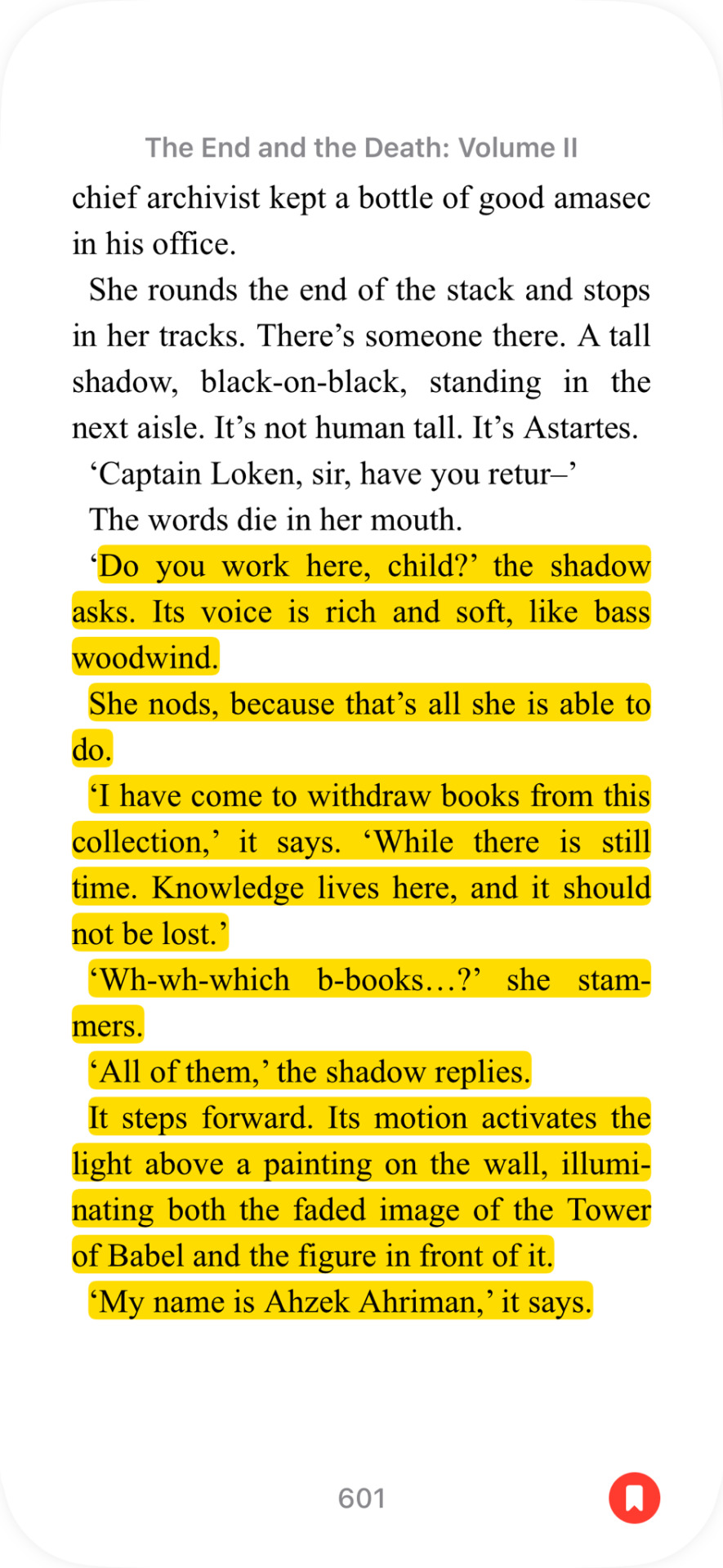
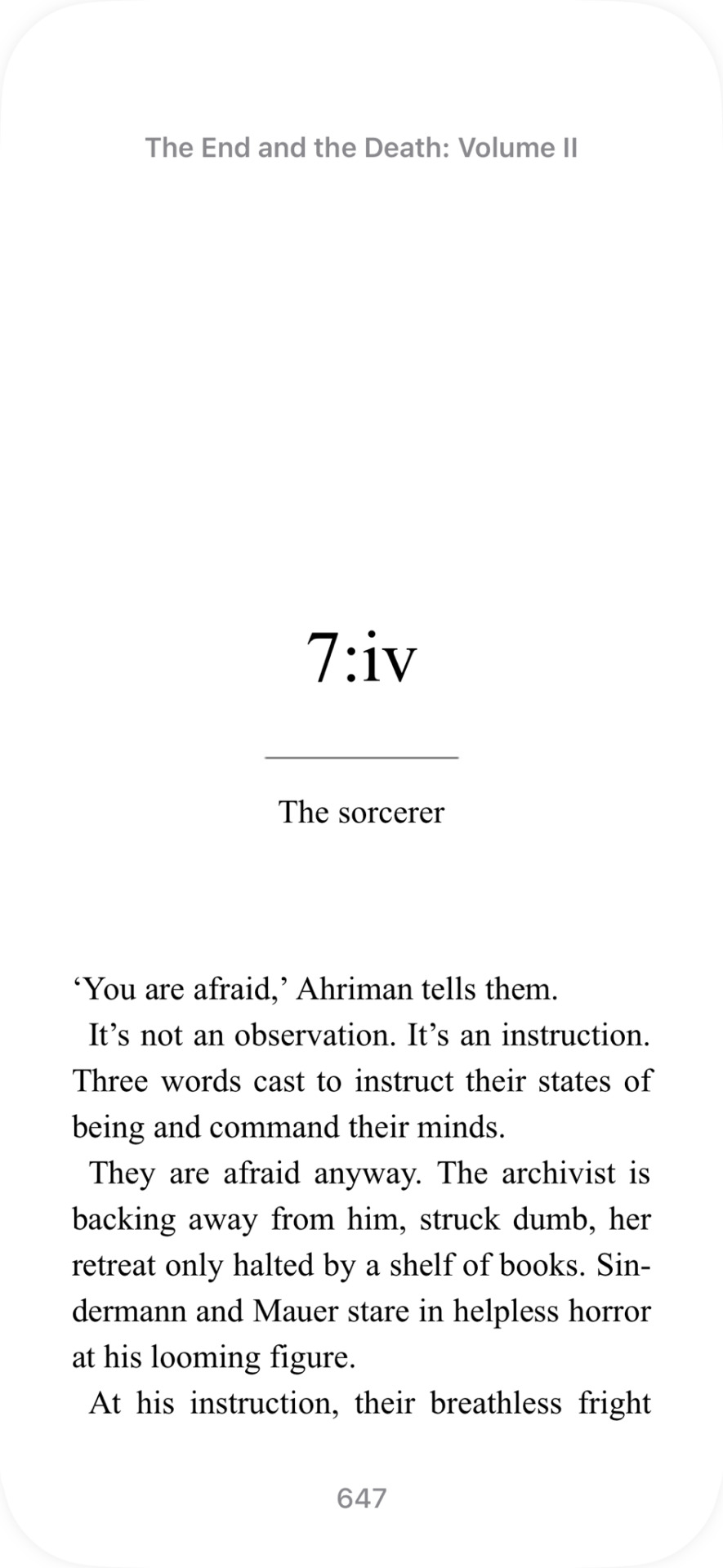

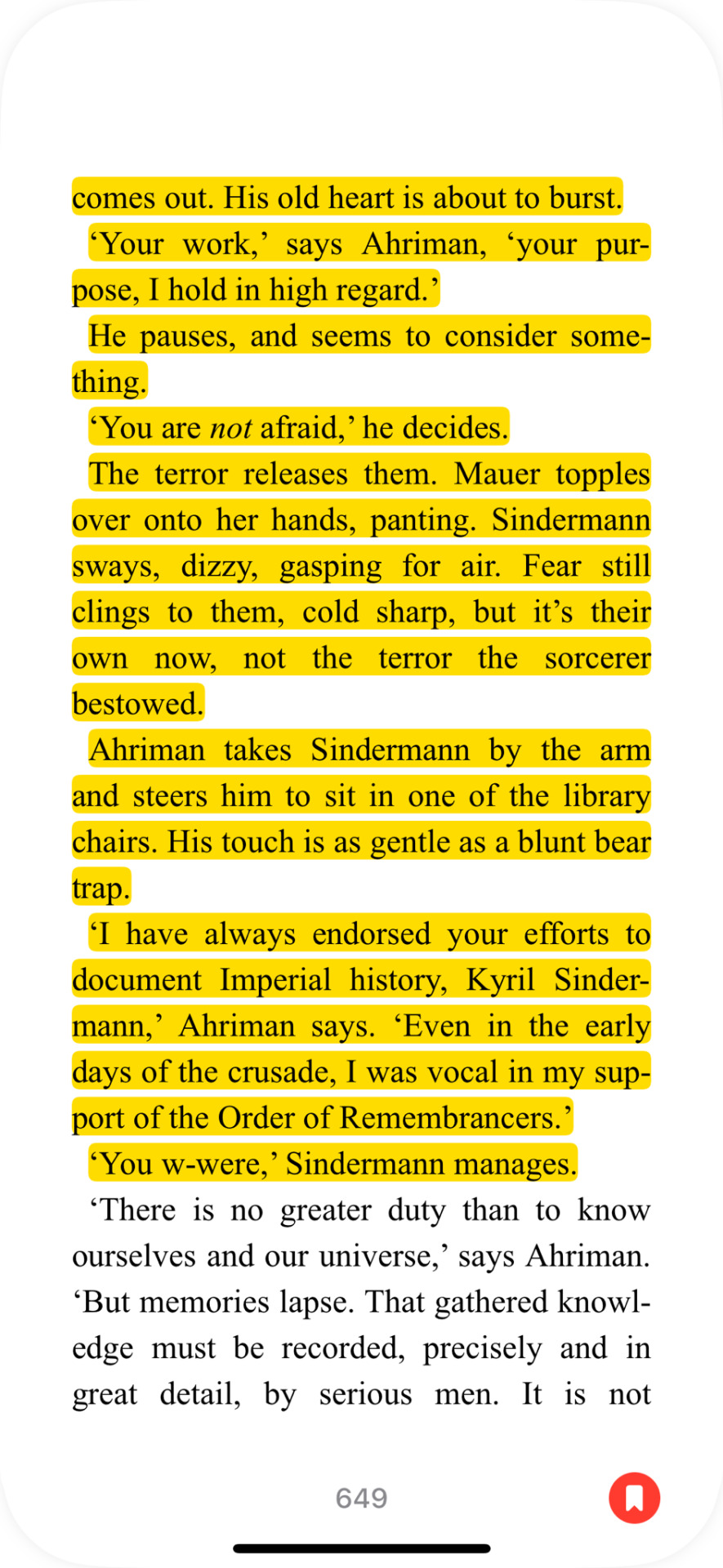
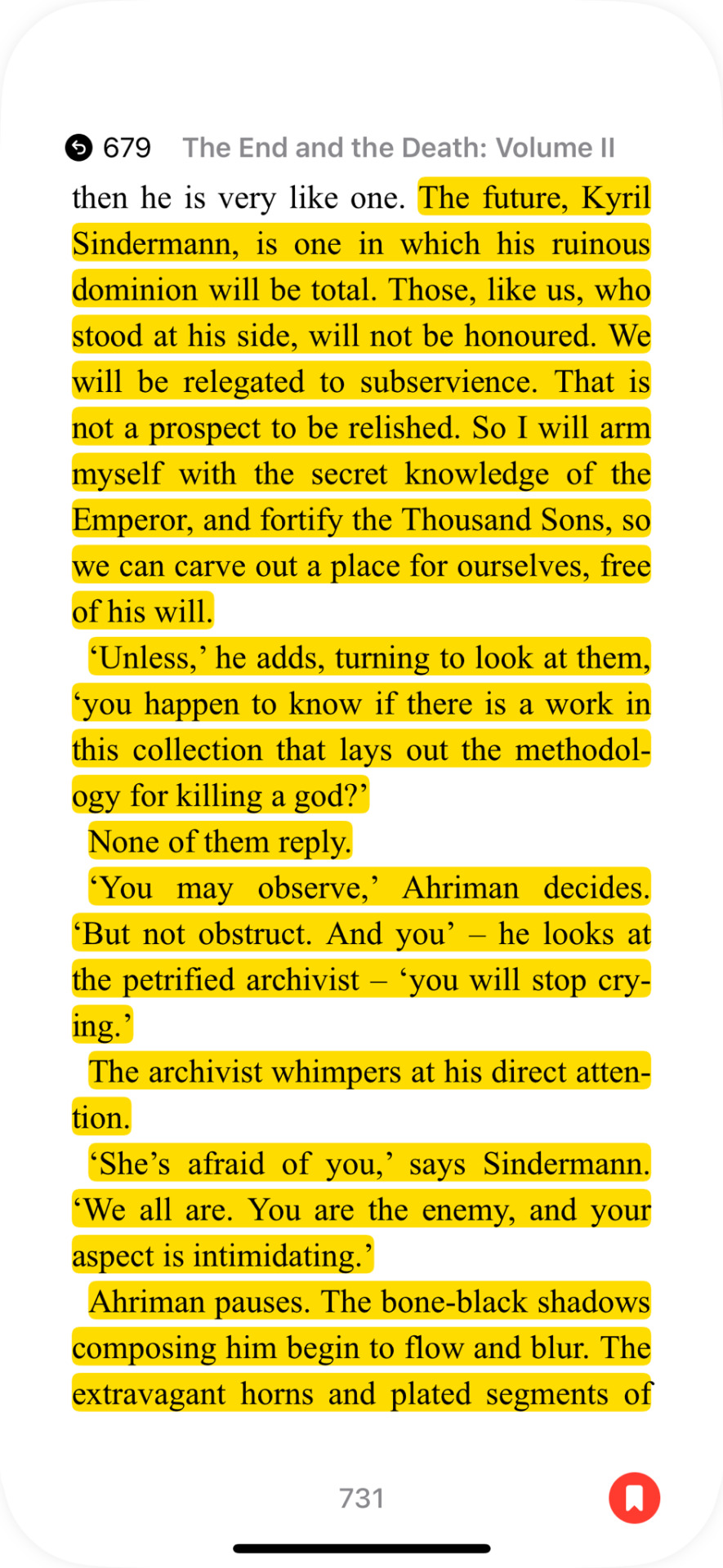

#ahzek ahriman#Kyril Sindermann#horus heresy#warhammer 30k#horus heresy novels#thousand sons#the end and the death
24 notes
·
View notes
Text
Assorted warhammer characters as onion headlines (1/?)


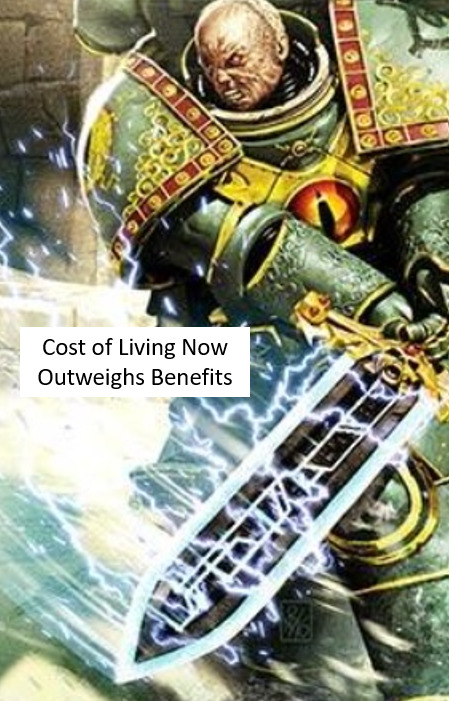
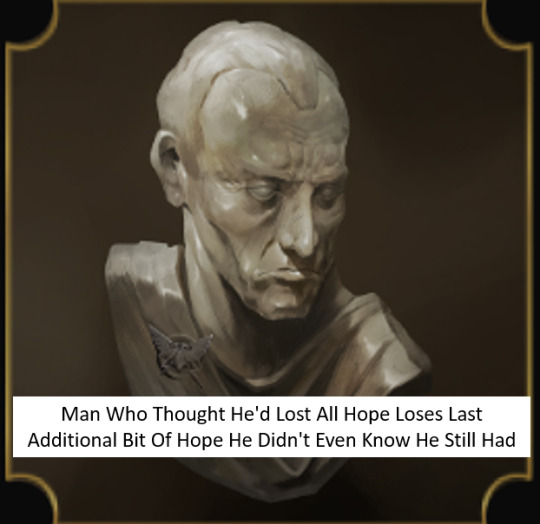

#argel tal#eidolon#horus aximand#kyril sindermann#ezekyle abaddon#Warhammer#warhammer 40k#onion headlines#memes#onion headline memes#warhammer meme#The Emperor Protects#or does he?
50 notes
·
View notes
Text
Top 10 End and the Death Volume 2 plot points summarized badly:
(with 10 minutes to go in the audiobook)
SPOILERS, SPOILERS, SPOILERS
Garviel Loken outwits ancient daemon with a philosophical theorem called I'm-Rubber-You're-Glue.
2. Ahzek Ahriman and Kyril Sindermann start a book club at the local library.
3. Khorne flees in terror before the might of Rogal Dorn's pedantry.
4. Rogal's mini looks like Peter Capaldi because he's going to have to punch a wall for a million years.
5. Fo's weapons development project continues to be boring.
6. Ollanius proves how much screen time a character has to take up before GW will let them tell the Emperor off.
7. The Dark King - Plot twist, it's not who you think it is - it's actually Stephen King! (But seriously - Rogal's endless desert, the random doors appearing to other places, and fated connections, I half expected someone to pop in with "all things serve the Beam".)
8. Abaddon is the only adult in the room.
9. Where are the traps? I was promised more traps! Flies buzzing and a Lord of Change don't count.
10. Sanguinius... much as I adore him ... really isn't the brightest star in the sky. (You were counting on being faster, but you did know he controlled time before you flew in there, right?)
#spoilers#the end and the death#primarchs#rogal dorn#sanguinius#ezekyle abaddon#Horus Lupercal#ahzek ahriman#garviel loken#horus heresy#warhammer 40k
15 notes
·
View notes
Note
Mersadie/Loken, fluff? 🥺
Yes!
Mersadie was not quite sure what to make of the first gift. A single spent bullet casing. It rolled around her open palm, gleaming dull gold. Loken enthusiastically pointed out a symbol messily etched into the side of the casing - a crescent new moon.
"The sniper must have been watching me for days," he said. There was a note almost of admiration in his voice. "Waiting to line up their mark. It pinged off my helm here."
He tapped his brow above the right eye, exactly where the crescent moon was proudly branded on his helm.
"I tracked down the casing after the fight was over. It was a good shot. Almost a shame it was wasted."
Mersadie had stared at him, unsure if he was joking. She accepted the odd gift with thanks. It sat upright on the little desk in her quarters.
The second gift was a slim, silvered dagger. It was far too small for his hands, Loken explained, but it was splendidly well balanced. She nodded and thanked him. Privately, she thought to herself that she was not the sort to wear a dagger strapped to her thigh. Or indeed anywhere on her person.
The third gift was an empty tin which previously contained armour oil. He earnestly told her that it had served him well, and wondered if it would be suitable to store her trinkets. The bullet casing, for example.
The following day she asked Sindermann what he made of all this.
"He doesn't... like me, does he? Astartes don't do that?"
Kyril had patted her arm, and said he would speak to Loken.
The fourth gift came later, after a long compliance action. When she attended his armouring chamber to interview him, he was uncharacteristically quiet. He shyly produced a small tin from his belongings.
The breath caught in her throat when he opened it and passed it to her. Carefully nestled inside was a delicate, sunshine yellow flower.
"It made me think of you."
"Oh," Mersadie said. Her heart seemed to swell. "It's beautiful."
"Yes." He looked for a second like he wanted to say something else, but glanced down at his hands instead.
"Thank you," she said softly. She bit her lip. "But... Loken, I have to ask. Do you know why you brought me this? And the others?"
He seemed to think hard, knitting his fingers together, before meeting her eyes. He smiled, just a little. The nervousness on his face unbalanced her.
"I think I like to make you smile," he admitted.
That was the best gift yet.
5 notes
·
View notes
Text
False Gods
This post contains spoilers for False Gods by Graham McNeill, first published as a novel on (as nearly as I can tell) June 1st, 2006.
This is a weird book.
The progression of events is fine. If you wrote this book as a list of scenes, and a description of what happens in each scene, and each character's motivation at the start of each scene and each character's motivation at the end, it'd hold together well. But the specifics are bad. Any time any two characters have an argument, they have a dumb version of that argument, with dumb points made badly. Every character in this book, almost all the time, is a louder, dumber, more caricatured pantomime of who they were in Horus Rising. The exception is when someone -- usually Kyril Sindermann -- is delivering exposition, in which case the dialogue is merely workmanlike. I suspect this was worked out as a very solid outline and then filled in quickly and that Graham McNeill -- at this point in his career, remember this was decades ago and maybe he improves over the course of the series -- just doesn't have the chops to write smart people having smart conversations at this point. (I sure hope he improves; he's written a lot of these books.)
It is so consistent that I'm able to imagine a better version of this book just by looking at the dialog we see, picturing it as placeholder dialogue, and extrapolating a better version of each conversation based on the more subtle, more intelligent, more learned versions of these characters visible in the previous book.
I need to give at least one example.
Here's a five page excerpt from the ebook in which Erebus of the Word Bearers is attempting to manipulate Horus into attacking the fortress of the dude he set to rule Davin, this planet he conquered years or decades ago, who's now rebelled. Erebus stole a magic sword in the previous book and has given it to the rebel, and his plan is to have Horus lead the vanguard of the attack so the magic sword can injure him, at which point Erebus will step in and take Horus to a magic healing spot where the Chaos gods will offer him power in exchange for healing, stoke his ambition, show him misleading visions, and get him to rebel against the Emperor.


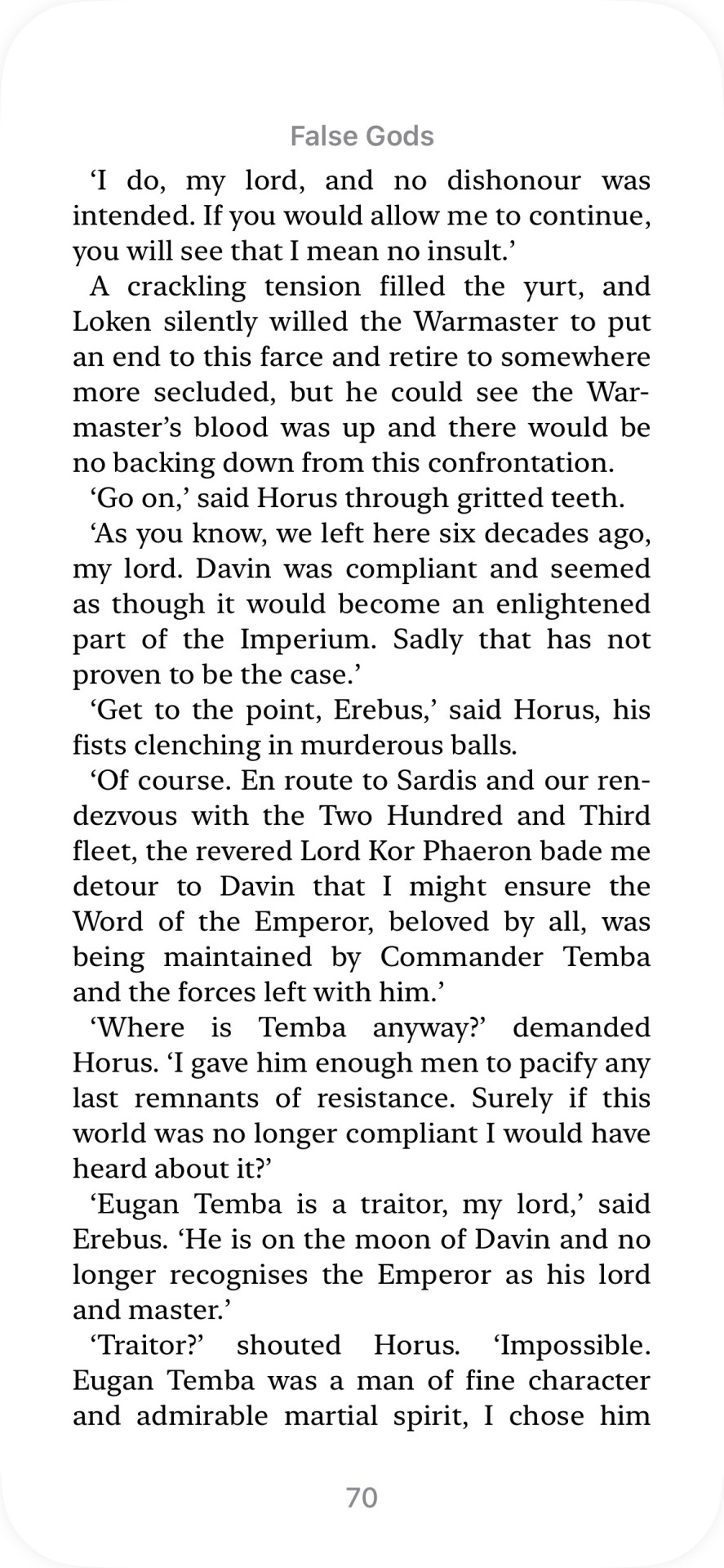
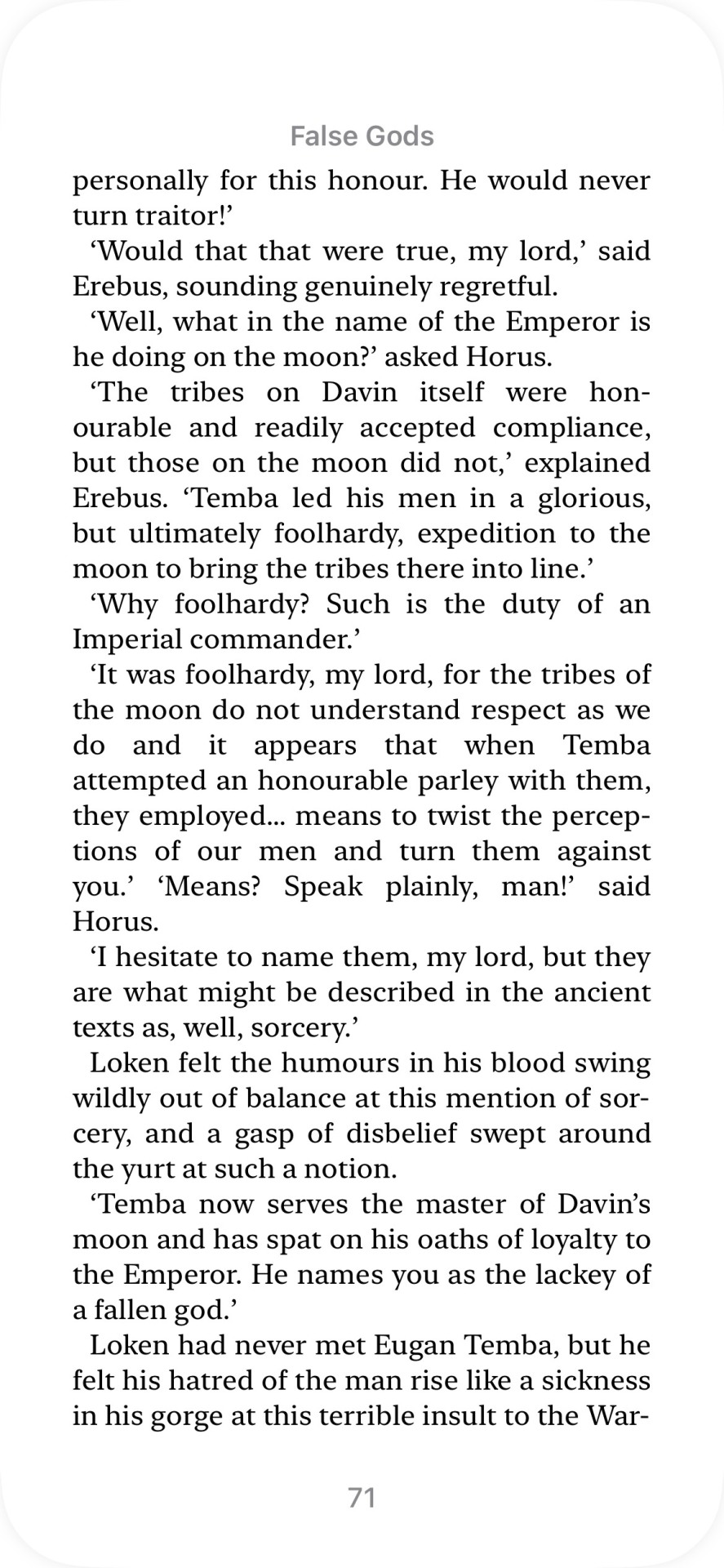

(You are going to have to pardon my highlights; I was taking notes as I read and I'm too lazy to remove them while taking the screenshots.)
Notice how Horus and his entourage are all stupid fucking meatheads and Erebus is the most obvious manipulator who ever lived? In the previous book, Horus and his entourage weren't stupid fucking meatheads, and they wouldn't have fallen for that -- but if Erebus had been in the previous book, he wouldn't have been that obvious. You can easily imagine a better version of this entire exchange, with more subtle points being made all around and more subtle manipulation happening, coming to the same outcome. You can extrapolate a better, smarter version of Erebus just by imagining a reversal of the character degradation from the previous book to this one. Every single argument in the book is like this, and this is a book about people having arguments.
Horus complains in this book about how he doesn't like being at the behest of bureaucrats and tax collectors and it comes off as petty, like his objection is he's too great to deal with that sort of trifle. Horus complained about the tax collectors in the previous book but it wasn't petty! Horus's whole point in the previous book was "The Emperor is locked in his basement and he's letting this new civilian government he's set up do whatever they want, and they're claiming his authority to enact taxation on conquered worlds but it's too soon, those conquered worlds haven't seen enough of the benefits of Imperial rule yet and if we start heavily taxing them now they're going to rebel and then we'll be stuck putting down rebellions until the end of time and it'll tear the Imperium apart, which I don't want to do! And my evidence for this is dad's smart enough to know it's too early to impose taxes; he's capable of predicting the same shit I'm predicting now, so it's gotta be the bureaucrats acting on their own. Why is my father letting the bureaucrats take his name in vain while destroying my work?" And given that Horus is a) explicitly described as a tactical and strategic supergenius and b) explicitly described as the Primarch closest to his dad, I… kinda buy that argument? Or at least I buy that Horus believes it wholeheartedly; I don't know, the Emperor is great at making bad decisions, maybe he did back the tax initiative, but Horus there is demonstrably smart and cautious and protective of his accomplishments and the Imperium's holdings and his father's honor and the pedestal he's put his father on. Also, interestingly, he accepts rebellion as inevitable and even sympathetic under certain circumstances. Meanwhile in the above excerpt Horus is acting like rebellion is an unthinkable affront to his honor, which is the most important thing in the universe.
(There's a more favorable reading of the excerpt where he just finds it unthinkable that a commander he appointed would rebel, but I'm not inclined toward favorable readings of the excerpted exchange.)
Those things I said in my discussion about Horus Rising Part 1: The Deceived and how noticing the title of the section might have made me like False Gods more? I take it back, there's nothing here that indicates Horus was already planning rebellion. Quite the reverse. We get his interior monologue and he spends a lot of time exclaiming how unthinkable rebellion is while talking himself into it.
That said! Once we get into the Chaos Vision Quest part of the book with Erebus pretending to be a dead guy from the first book and giving Horus a tour of the past and future -- and I appreciate the ambiguity as to whether it's actually the past and future or just warp reflections of it -- I kinda buy Horus's reasons for rebellion, once I picked up something the book doesn't draw attention to. The Imperial war apparatus places a great emphasis on leading from the front and how a leader earns the respect of their (well, let's face it, his; not a lot of women in military authority roles in these books yet) troops by leading from the front, because this is based on a wargame where your leader is a guy on a tactical rock with a lot of strong attacks and a buffing aura, and that's been the case for not just the entire two hundred years of the Great Crusade but however many centuries before that the Unification Wars took. Horus is super-primed to see the Emperor retiring to Terra as an insult and as a move that warrants he, Horus, ought to start disrespecting the Emperor.
There's also a kind of interesting bit where Horus worries that his appointment to Warmaster to finish the Great Crusade is just in time for the Great Crusade itself to turn into a gloryless mopup effort, robbing him of the fame he expected the title to earn him, especially interesting in the context of having just botched his attempt at a novel peace with the interex, where he really tried to get out there and be his own man and accomplish something the Emperor never did. It does come across as a prideful man realizing he may have been spurned, and that he may need to do something drastic to get the reputation he wants. I don't really buy the idea that Horus would be shocked and appalled to learn that he was grown in a lab, because, like… I assumed he knew that? But I do buy that he'd be primed to believe that the 40k future with a God-Emperor and only the nine loyalist Primarchs recognized as such by a pathetic population of wretched worshipers might be the Emperor's plan in the context of how Horus would be inclined to view someone who quits the field of battle. He also claims explicitly that each of the Primarchs embodies part of the Emperor's personality and he, Horus, embodies the Emperor's ambition specifically, which both fits with what we've seen of him and explains why he'd react so badly to feeling like his ambitions are about to be foiled.
Also, the previous book made an effort to establish that once you invite Chaos into your heart, the trend towards malevolence and corruption is quick and aggressive, so once Horus goes "Yeah, sure, I'll accept your healing, Ruinous Powers that I don't know are called Ruinous Powers" he might immediately become a huge asshole. But, again, that's all well after the excerpted bit. So to the extent that this book sets out to answer the question "How did Horus fall?" it does so reasonably well albeit clumsily.
There are a couple more scenes where Loken is investigating what happened with Samus and Xayver Jubal and people are like "Trust me, there's no intelligences in the warp; it's just energy" and Loken is "Not sure I believe that but okay" or people go "Hmm this ancient text suggests that there might be intelligences in the warp who can possess people" and Loken reacts with doubt and shock, and again I find myself looking at the page and going "Horus told you about Warp intelligences in the first book in so many words and you accepted it!" Like, that scene from Horus Rising that I hated is now an actual plot hole. Sigh.
There's a point where someone says "My mouth's as dry as a Tallarn's sandal"; that's an anachronism, later books in this series will deal with Tallarn being turned from a verdant paradise into a scorched desert. I'm calling this one out for two reasons. The first is because I'm trying to notice anachronisms as I go because I think it's interesting how the writer pool's common understanding of the timeline of the Heresy evolves as the series progresses, and in that context it's just a curiosity. It's fine. They had no way of knowing there'd be a series of short stories compiled into a book called Tallarn a decade later. But on another level... I really hate this sort of SF/F Brand Aphorism, like when someone in a Star Wars book says "This place is as smelly as a Rancor's armpit." Stop it, it always comes across as clumsy. It's like watching a Funko! Pop emerge from the page as I read. "Hey, customer, you like [BRAND], right? Would you like to be reminded of [BRAND]?" Dude I am reading a tie-in novel, obviously I like [BRAND], you don't need to pile it on so heavily. Just say no to these, I beg you.
5 notes
·
View notes
Text
[fic] The Backup Plan, chapter 2
Title: The Backup Plan
Series: Warhammer 30,000/40,000
Pairings: Nathaniel Garro/Eupharti Keeler, Euphrati Keeler/Mersadie Oliton, Nathaniel Garro/Saul Tarvitz (mentioned and in flashbacks), Garviel Loken/Mersadie Oliton (mentioned and in flashbacks)
Characters (overall): Nathaniel Garro, Euphrati Keeler, Mersadie Olition, Meric Voyen, Iacton Qruze, the crew of the Eisenstein, Death Guard Ensemble, Saul Tarvitz (mentioned and in flashbacks), Garviel Loken (mentioned and in flashbacks), Mortarion (mentioned and in flashbacks), Horus Lupercal (mentioned and in flashbacks), Original Human Characters
Characters: (this chapter) Nathaniel Garro, Meric Voyen, Euphrati Keeler, Mersadie Oliton, Kyril Sindermann, Original Human Characters
Word Count: (this chapter) 3440
Story Summary: Supplies are low on the Eisenstein, and not just on food. With some of these supplies, rationing is not possible - it will take a creative solution to survive until they’re found.
Alternatively, an AU of “what if 40k had a/b/o,” taking place during Flight of the Eisenstein, and what life looks like while waiting for a miracle.
Chapter Summary: On the recommendation of Kyril and Euphrati, Mersadie tries to do something for herself. What she doesn't yet know is, it might help Nathaniel as well.
Notes: This is a story about love and grief and learning how to live again after trauma, somehow with a lot of sex and humor. The fic is rated Explicit, but the rating of this individual chapter is Teen and Up.
Link to Chapter 2 on Ao3, or start at the beginning.
2 notes
·
View notes
Text

So Nathaniel Garro is a character I like a lot and a big contributing reason I wanted to make the effort to build a physical chapter in his image.
“Nathaniel Garro was originally the battle-captain of the Death Guard Legion's 7th Great Company and later became the leader or Agentia Primus of a band of Space Marines gathered from all the Legions known as the Knights-Errant who remained loyal to the Emperor of Mankind and were directed on missions chosen by Malcador the Sigillite, the Regent of Terra.” 1
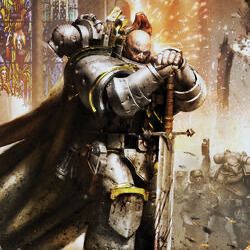
I really love the story of the original Dusk Raiders from Albania on Terra and their foremost defiance to totalitarian leadership (which, with any luck we will get into at a later time). Garro was one of the first men to be integrated into the Space Marine Project and even after more of his brothers would originate from Barbarus (the Death Guard’s new home world) he would be the chapter’s tether to Terra.
To not go too deep into the lore right this second, while Garro had/has a lot of adventures, accolades, and projects after disassociating himself from his former traitorous legion the one I find most interesting is his formation of the Grey Knights. I want to bring over some of those ideas and imagery into the army as I continue leading eventually to a custom chapter master that is Garro.
“Garro's fate in the wake of the Horus Heresy is not currently known, though there are several conflicting stories. Kyril Sindermann, a future Inquisitor, described Garro as the first true martyr of the church of the God-Emperor.
Despite this, conflicting testimonies claim that Garro variously remained imprisoned with The Seventy until his death; went on to serve at the Master Apothecariate seeking a cure to Nurgle's Rot, a path followed by fellow Eisenstein survivor and Apothecary Meric Voyen; that Garro still lives in the 41st Millennium and commands an elite Astartes task force clad in the colours of the pre-Heresy Death Guard; or that he was ultimately possessed himself by the Lord of Flies.” 2
Now in the lore it’s never specified what happened to him and there’s a lot of conflicting in canon speculation as to his fate. In all honesty it’s more than likely that he’s dead. Even with the Space Marine’s legendary durability and immunity of disease it’s unlikely that ten thousand years does anything but damage to anyone. The one in particular that interests me the most is the one where he’s not only alive but that he commands a small force of marines wearing the colors of loyalist Death Guard.
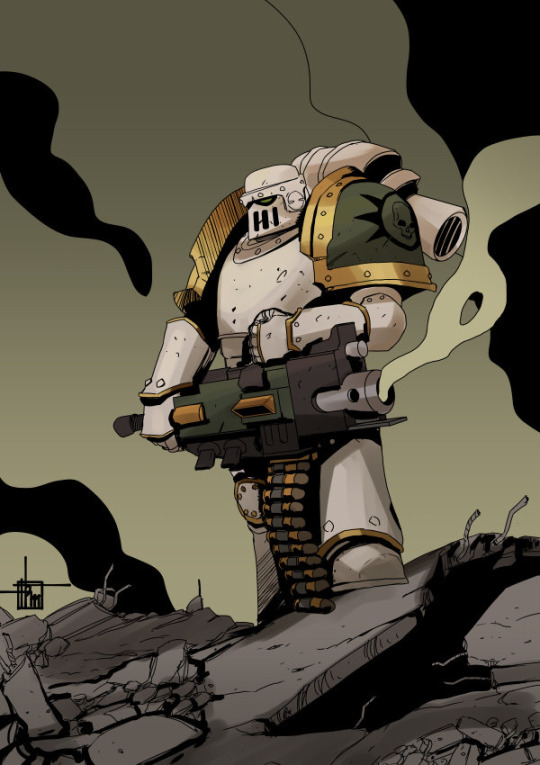
Sorry for the longer post but Garro deserves a lot of description not just as a character but also how he’s influenced the project. Next time I’ll show in what ways I think his formation of the Grey Knights translates to models.
#chaos space marines#chapter#custom#death guard#miniature#miniaturepainting#minipainting#nurgle#space marines#tabletopgames#Nathaniel Garro#Garro#lore#warhammer 40000#warhammer 40k#warhammer#istvaan 3#grey knights#grim dark#14th legion
45 notes
·
View notes
Text
Promeus and Moriana
Two of the Inquisition’s founding Four, these two were the original ressurectionists. Moriana would go on to take the radical path, becoming the damned seer of Abaddon the Despoiler.
You can read some more about them in Inquisitor: The Thorians (that’s a free archived .pdf there), and Moriana pops up in Iron Warrior and Eye of Night.
We know from The Beast Arises that the first Inquisitors probably won’t be using their original names. With that in mind, I have a theory about Moriana’s identity.
Right out of the gate there will be the *biggest* spoiler for The Crimson King below the cut. I mean, it’s tangential to the actual plot, but when I read it I literally made a weird squeal/gasp. Although, if you didn’t know who Promeus and Moriana were before reading this you probably wouldn’t consider it as big a deal as I did. These kind of references are my jam tho.
Promeus is Lemuel Gaumon, the psychic remembrancer who became Ahriman’s apprentice in A Thousand Sons. That’s the spoiler.
Moriana? I think she’s Camille Shivani. We know Camille’s a psyker, and in The Crimson King she’s able to locate a shard of Magnus on Terra decades in the past by touching the chain on the Book of Magnus - not exactly the kind of clairvoyance Moriana is known for, bu hey it’s a solid foundation. Moriana and Promeus were bitter enemies, and while that’s at least partly to do with their disagreement on how to resurrect the Emperor, it doesn’t hurt that Camille already hates Lemuel for using his psychic powers to make a mother murder her baby to escape detection by daemons.
If I’m correct, we have three of the Four:
Promeus (aka Lemuel Gaumon)
Moriana (aka Camille Shivani)
Lastan Neemagiun Veritus (aka Kyril Sindermann)
As Agentia Tertius to the Sigillite and with an Exterminatus already under her belt, Amendera Kendel is the frontrunner for the final spot, but Yasu Nagasena is another contender.
#nobody expects the imperial inquisition#40k theory#warhammer 40k#horus heresy#the crimson king#spoilers
3 notes
·
View notes
Quote
It is the folly of man to believe that they are great players on the stage of history, that their actions might affect the grand procession that is the passage of time. It is an insulating conceit a powerful man might clasp tight to his bosom that he might sleep away the night, safe in the knowledge that, but for his presence, the world would not turn, the mountains would crumble and the seas dry up. But if the remembrance of history has taught us anything, it is that, in time, all things will pass. Unnumbered civilizations before ours are naught but dust and bones, and the greatest heroes of their age are forgotten legends. No man lives forever and even as memory fades, so too will the remembrance of him. It is a universal truth and an unavoidable law that cannot be denied, despite the protestations of the vain, the arrogant and the tyrannical.
Kyril Sindermann, Preface to the Remembrances.
0 notes